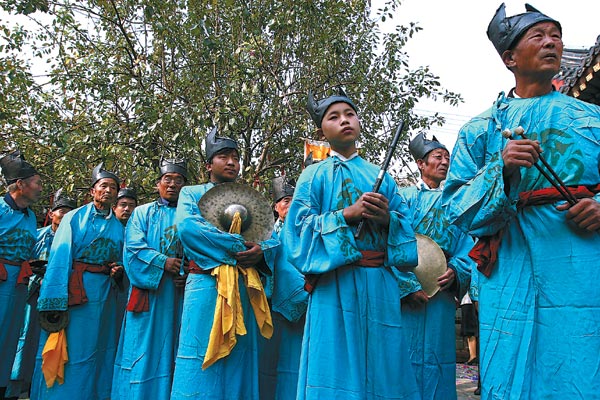 |
|
Folk musicians from Qujiaying village prepared to perform at a music festival at Beijing’s Zhihua Temple in 2006. The Qujiaying music tradition has been carried down for centuries. Photos by Sun Yun / For China Daily
|
Mission vs Passion
Like other traditional arts, Jing Music was on the verge of extinction when China emerged out of the chaotic vandalism of the “cultural revolution” (1966-1976). In the 1980s, Zhihua Temple brought back a few monks who had learnt the music and survived the political process, to restore its ensemble. Zhang Benxing was one of them.
At the First Beijing Cultural Festival in 1991 Zhang spotted Hu Qingxue, who was performing Qujiaying Music with a group of young farmers from Qujiaying Village, Gu’an County, Langfang City in Hebei Province.
This ancient music form also has its roots in Buddhism. On graduating from junior middle school, Hu Qingxue and five other boys apprenticed to an elderly folk musician in the village, staged performances in the area, gradually building up a reputation among local rural communities. This got them a ticket to the First Beijing Cultural Festival.
Qujiaying Music shares many similarities with Jing Music: the musical instruments used are almost the same, and both employ Gong Chi notation. With a nod from his superior, Zhang admitted Hu Qingxue and five other boys into the Zhihua Temple in December 1991, formally accepting them as the 27th generation of successors to this ancient music.
Zhang was sent to the temple at a young age, but resumed secular life after the founding of the People’s Republic, as did other monks at Zhihua Temple. Hu and his fellow students thus no longer had to be monks to learn their art, though they continued to spend the subsequent years in seclusion.
As Jing Music in the past was played as part of religious rituals, there were rigorous requirements for the deportment of the performers, who had to undergo years of training in the particular etiquette of walking, standing and sitting, in addition to the music courses.
Hu Qingxue recalls how he used to practice the flute on the patio of the temple for long hours during deep winter days, when he could see his breath freeze. Another daily routine was rehearsing in the Temple of the Sun Park in central Beijing. “We set off at five in the morning, pedaling our teacher Mr. Zhang, who was in his 70s, on a tricycle. We did that every day for years,” Hu said. “Our master placed high expectations on us, hoping we could keep passing down this art.”
Art or Bread
Despite such toils and pains, the fulfillment of learning an exalted art form is great. Yet when Hu Qingxue reached adulthood, real life concerns became pressing and prominent. At 21, he realized that with the small allowance from the temple, his sole income, he had no way to start a family and support them. He finally made the difficult decision to take on a better-paid job, and left Zhihua Temple. His five classmates soon followed suit. The temple ensemble thus fell apart once again.
Hu returned to his hometown in Hebei Province, where he started a transport business after getting a driver’s license. With the handsome income he earned from it, he soon got married, and then had children. Jing Music became a thing of his past.
In the winter of 2013 Zhihua Temple planned to release a Jing Music recording, as a solid way to preserve this artistic heritage for future generations. The vice-curator of the temple museum, Sun Suhua, invited Hu Qingxue and his former classmates to join this project, and they agreed. After a full month of rehearsals, the group produced four CDs with 39 melodies of Jing Music. At the conclusion of the recording project Hu and his buddies headed back to their hometown and their daily lives. This experience, however, rekindled their feelings for the music. This is why they went back to the temple a couple of months later, when Sun told them that the municipal government of Beijing had launched a project to preserve Jing Music.
“The vice-curator called me, saying the government now pays unprecedented attention to intangible cultural heritage. With Mr. Zhang in his twilight years, if we didn’t take on his mantle, Jing Music would be buried in oblivion with this generation,” Hu said.
As an incentive, Zhihua Temple offered a salary, though far below what he could earn from his transport business. Still Hu decided to accept the offer. “I love this music from the bottom of my heart, and aspire to work on something I truly love. Another reason is that we all know that Jing Music has no chance of passing down in history if our band did not reassemble,” he explained.
On returning to Zhihua Temple, Hu and other members of the band rehearsed all the works they had learnt, and in doing so gained a fresh understanding of the music, which inspired them to produce the second recording. According to Hu, further practice and performance over the past years have exposed him to the soul of Jing Music and honed his skills to the point of being able to express it through his own rendition.
we recommend:
